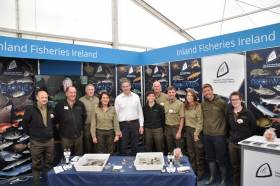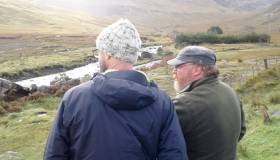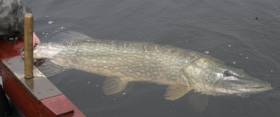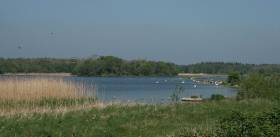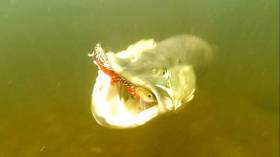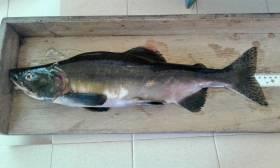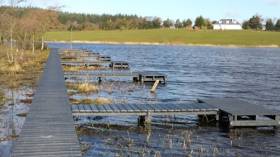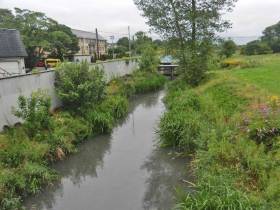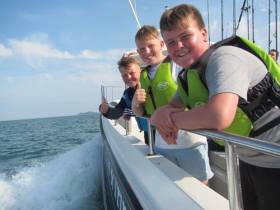Displaying items by tag: Inland Fisheries Ireland
New Angling Bye-Laws For Lough Muckno, Lough Lene & River Vartry
#Angling - Three new angling bye-laws have been introduced in the Eastern River Basin District by Minister of State with responsibility for Inland Fisheries, Sean Kyne.
Conservation of Coarse Fish and Pike Dundalk District (Lough Muckno) Bye-law No 950, 2017 has been introduced for Lough Muckno, near Castleblaney in Co Monaghan.
This bye-law provides for catch and release for all coarse fish and pike on the lough. Anglers must use keep nets to hold any coarse fish or pike and all fish are to be subsequently released.
The regulations apply to Lough Muckno including Gas Lake and the waters up to Derrygreevy Bridge, the tributary up to Frankfort Bridge, County Water up to Wallace’s Bridge and the Clarebane River up to Clarebane Bridge.
On Lough Lene in Collinstown, Co Westmeath, the Annual Close Season Bye-law No 322, 2017 now applies.
This new bye-law has extended the open season such that anglers fishing for brown trout or rainbow trout can now fish from 1 March until 12 October.
On the River Vartry in Co Wicklow, the River Vartry System (Conservation Bag Limit) Bye-law No 952, 2017 has been introduced.
An angler is now permitted to take one sea trout (40cm or less) per day from the river during the open season, which runs from 1 March to 30 September. The River Vartry is closed for fishing for salmon and sea trout over 40cm.
All three bye-laws came into effect on 1 October 2017.
Inland Fisheries Ireland’s Dublin director Brian Beckett said: “These new bye-laws are designed to protect and conserve a range of fish species while supporting important angling amenity activities within the Eastern River Basin District.
“These fish populations are valuable from a number of perspectives including biological diversity and angling amenity and Inland Fisheries Ireland hope that these measures serve to reinforce the importance of protecting and conserving all our fisheries in the future.”
Biologist Presents Novel Approach To Boosting Wild Atlantic Salmon Numbers In Irish Rivers
#Angling - An international fisheries biologist has suggested a novel approach to boosting numbers of wild Atlantic salmon in Irish rivers — by moving wild fry from more abundant areas to weaker spots within a catchment.
Dr Kyle Young, a research associate from the University of Zurich, was recently invited to give a presentation as part of the Inland Fisheries Ireland (IFI) Research Seminar Series, at which he outlined his proposal for translocation of salmon fry.
Natural survival bottlenecks are experienced by Atlantic salmon through each stage of its lifecycle, from egg to fry, fry to parr, parr to smolt and so on, he outlined. Under natural conditions, the vast majority of wild salmon fry do not survive to become parr.
These so called “doomed majorities” can be present in sections of rivers with an initial abundance of emergent salmon fry, whose subsequent population size is constrained by density-dependent mortality and by the carrying capacity of the habitat.
Dr Young proposes that such fry could be translocated from these areas to low or non-productive sections of the same river where suitable habitat is present, in an effort to potentially boost the overall production of native wild salmon populations.
This approach may minimise the unintended negative consequences of more conventional salmon stocking programmes where wild salmon broodstock are taken from spawning areas and eggs fertilised in the hatchery.
Hatchery-origin fish are also typically less well-adapted to thrive than their wild compatriots and the overall fitness of the wild component of a population may be compromised through lower overall survival, interbreeding and competition for resources with stocked fish.
IFI’s head of R&D Dr Cathal Gallagher said: “We were delighted to welcome Dr Young to our headquarters in Citywest to further explore the potential of this novel proposal to boost wild Atlantic salmon populations.
“This iconic species is of both major conservation and socio-economic importance to Ireland. Although wild salmon are widely distributed in Irish freshwaters, their long-term sustainability remains under continued threat from a variety of factors. These include habitat degradation, issues related to aquaculture, oceanic and climatic change, pollution, illegal fishing and over-fishing.”
Following the seminar, Dr Young visited the National Salmonid Index Catchment (NSIC) at the River Erriff, the Galway Salmon Fishery and the Cong hatchery facility to further discuss his theorised approach to salmon stocking with IFI management, field staff and researchers.
IFI are discussing the possibility of undertaking experimental trials with this novel approach to boost juvenile salmon production upstream of their trapping facilities in the Erriff catchment.
Anglers Already Involved With Review Of Pike In Brown Trout Fisheries, Says IFI
#Angling - Inland Fisheries Ireland (IFI) has spoken out over anglers' fears of the threat of pike to wild brown trout numbers.
Earlier this week, the Connacht Angling Council launched a campaign and online petition in an effort to provoke action its members argue is necessary to protect brown trout numbers from “predator” pike in Lough Corrib, Lough Mask and other lakes in the region.
However, in a statement released yesterday (Thursday 21 September), IFI said it was “regrettable that stakeholder groups are campaigning and taking unilateral action”.
The fisheries body argues that the main representative groups for both trout and pike angling are “already part of the inclusive review process”, and gave oral submissions earlier this year as part of last winter’s public consultation on pike management in wild brown trout fisheries, as previously reported on Afloat.ie.
“At this time, no conclusions or recommendations have been made. It is important that the [Management of Pike in Designated Wild Brown Trout Fisheries Policy] Review Group, with inputs from all stakeholders, is facilitated in completing its work,” the statement added.
“Given the strongly held views of the two angling stakeholder groups involved, trout anglers and pike anglers, it is IFI’s view that consensus will only be achieved if representatives from both groups participate in a constructive and respectful way in the current process, and away from mainstream and social media.”
Fish Stock Survey On Lough Ennell This Week
#Angling - Inland Fisheries Ireland (IFI) is currently carrying out a fish stock survey on Lough Ennell, near Mullingar, to assess the current status of the fish populations in the lake.
The survey takes place from today (Tuesday 19 September) till the Friday (22 September) and will involve netting throughout the lake undertaken by IFI staff from Limerick and research staff from Citywest headquarters crewing a total of two boats.
It’s expected that the survey will provide a range of information on the fish stocks in the lake, such as size distributions of fish captured, age and growth information for all species, diet of selected species, and catch per unit effort (CPUEs) for each fish species.
Samples for genetic analyses of brown trout and pike will also be taken. The information collected will assist IFI in managing, conserving and monitoring any changes in the fish stocks of the lake.
The survey crews will be very visible on the lake and all sets of nets will be marked with distinctive buoys labelled ‘IFI Survey’. Any anglers or other lake users are asked to be vigilant if out and about on the lake to avoid snagging in the nets.
Further details on the background of this survey are available on the IFI website.
Connacht Anglers Fear Threat To Wild Brown Trout By ‘Predator’ Pike
#Angling - Wild brown trout in Connacht lakes face extinction due to unchecked numbers of pike, local anglers fear.
According to Galway Bay FM, the Connacht Angling Council says stocks in Lough Corrib and Lough Mask are among those under threat unless measures such as a closed season for angling and a pike cull are introduced.
Ahead of its ‘Pike are Predators – Save our Wild Brown Trout’ campaign launch this Wednesday 20 September from 8pm at the Boat Inn in Oughterard, the council has launched an online petition in the hopes of persuading Inland Fisheries Ireland to take action against the “predator” species.
Rise In Fish Kills Recorded In EPA Water Quality Report Disappointing Says Fisheries Agency
#FishKill - Inland Fisheries Ireland (IFI) has expressed disappointment at the findings of the Environmental Protection Agency (EPA)’s water quality review.
According to the EPA report, published yesterday (Thursday 31 August), the total number of reported fish kills in 2013–2015 was 97 — an increase in fish kills compared to 2007–2009 and 2010–2012.
In several instances of fish kills, the exact cause was unknown and several influences may have played a part.
IFI has cautioned against singling out any particular sector for the standard in water quality across Ireland’s river basins and lakes, backing the EPA’s findings that “multiple factors” are at play.
“There were 31 separate fish kills across the country last year, but just eight of those were directly attributable to agricultural activities,” said IFI chief executive Dr Ciaran Byrne.
“Inland Fisheries Ireland is grateful to the farming community for their continued consideration and vigilance. Good farmyard management can help to prevent accidental runs of polluting substances and protect the local environment.”
In addition to the agricultural-related kills, two fish kills were as a result of municipal works and one by industrial works.
In four instances, the exact cause of the fish kill was difficult to ascertain while 16 incidents of fish kills were as a result of disease and natural causes.
IFI carried out over 22,000 environmental inspections in 2016 across industrial, forestry, engineering, water treatment, farmyards and wind farms sites to help identify any risks and prevent damage to the local aquatic habitat.
“From an ecological and angling tourism perspective, our rivers and lakes are vital national resources,” said Dr Byrne. “It is essential that we protect and conserve these assets and water quality has a significant impact on fisheries habitats and populations.”
Heightened Alert Over Non-Native Pink Salmon In Irish River Systems
#PinkSalmon - Inland Fisheries Ireland (IFI) has appealed to anglers and the general public to remain vigilant and report the presence of any Pacific pink salmon in Irish river systems.
To date, 30 pink salmon have been recorded in nine Irish rivers since the first catch was reported on 27 June from the Galway Weir fishery.
One of the most recent captures of pink salmon was a mature male ready to spawn on the River Erriff in Co Mayo.
This fish was caught on 9 August in Ireland’s National Salmonid Index Catchment, where a wide range of scientific research and monitoring activities on resident salmonid populations is undertaken.
Catches of pink salmon have also been reported on rivers including the Foxford Fishery in Co Mayo, the Coolcronan Fishery on the River Moy, the Galway Fishery on the River Corrib, the Cong River on the River Corrib and the Drowes and Crana Rivers in Donegal.
The most recent catch was on the Owengarve River in Mayo on 10 August.
As previously reported on Afloat.ie, pink (or humpback) salmon are a migratory species of salmon, native to river systems in the northern Pacific Ocean and nearby regions of the Bering Sea and Arctic Ocean.
The species also has established populations in rivers in northern Norway and in the far northwest of Russia, originating from stocking programmes undertaken in this part of Russia.
In Ireland, there is no licence to farm Pacific pink salmon. The appearance of the species is of concern to IFI as it may impact Ireland’s indigenous Atlantic salmon populations in the future.
The potential impact of pink salmon is unclear at present but these fish may introduce parasites and pathogens not present in native salmonid fish.
Interbreeding with Atlantic salmon is unlikely as pink salmon spawn in late summer whereas Atlantic salmon spawn in winter. However, competition for food and space in nursery areas between juvenile pink and Atlantic salmon is possible.
IFI is appealing to anglers to report catches of pink salmon to Inland Fisheries Ireland’s 24 hour confidential hotline number (1890 34 74 24 or 1890 FISH 24). As these fish die after spawning, some dead specimens could also be encountered along Irish rivers.
Anyone who catches a pink salmon is asked to:
- Keep the fish and do not release it back into the water (even in rivers only open for catch and release angling).
- Record the date & location of capture, length and weight of fish.
- Tag the fish and present it to IFI and a new tag will be issued to replace the tag used.
- Take a photograph of the fish.
- Report it to IFI’s 24-hour confidential hotline without delay.
Collection of the fish will then be arranged for further examination. This will help establish the abundance and extent of distribution of the species in Irish waters.
IFI has also developed a Pink Salmon Factsheet and Identification Flyer to help anglers identify the fish.
#Angling - Sean Kyne TD, Minister of State with responsibility for Inland Fisheries, has today (Wednesday 9 August) welcomed a new €2 million funding call from Inland Fisheries Ireland (IFI) for angling projects and conservation initiatives.
The funding call, which consists of three separate funding streams, will help ensure that Ireland’s fish stocks and angling infrastructure are protected and enhanced into the future.
The 2017 IFI funding call is made up of the following funds:
- Salmon Conservation Fund to a maximum of €500,000
- Midland Fisheries Fund of €50,000
- National Strategy for Angling Development Fund (NSAD) €1,500,000
“As minister with responsibility for Inland Fisheries, I have ensured that significant funding under the National Strategy for Angling Development was available from my Department in 2017 to help Inland Fisheries Ireland develop a wide ranging investment initiative,” said Minister Kyne.
“I welcome the fact that the funding programme is rooted in community-led actions and I support Inland Fisheries Ireland in its enhancement plans. I also want to encourage angling bodies, community groups and local authorities to take up the funding opportunity and meet the development challenge at local, regional and national level.”
IFI is inviting applications for funding for projects across a number of areas, from fisheries habitat enhancement and sustainable development works to marketing and promotional projects for angling.
Applications are invited from groups, associations, clubs, local authorities or other appropriate bodies looking to improve Ireland’s fisheries resource.
IFI chief executive Dr Ciaran Byrne said: “Today’s announcement sees Inland Fisheries Ireland make over €2 million available to communities nationwide, for projects which will help contribute to an accessible and sustainable world class inland fisheries and sea angling resource for all.
“We want to ensure that we continue to invest in conservation, while also developing our angling offering in Ireland. While the National Strategy for Angling Development funding stream focuses on improving angling access with a view to attracting more domestic and overseas anglers to the pursuit, the Salmon Conservation Fund and Midland Fisheries Fund re-invest the contributions of anglers into valuable initiatives which a view to promoting the recovery of salmon stocks and habitats and supporting sustainable development works in the Midlands respectively.”
IFI will hold regional information workshops for those interested in applying for funding with a view to giving participants a better understanding of the various funding streams and how they can apply via an online system.
The workshops will take place at the following locations and dates (7pm each date unless otherwise stated):
- Tuesday 29 August - Clonmel Park Hotel, Clonmel, Co Tipperary
- Wednesday 30 August - Castle Hotel, Macroom, Co Cork
- Thursday 31 August - Maldron Hotel, Southern Ring Road, Roxboro, Limerick
- Monday 4 September - CityNorth Hotel, Gormanston, Co Meath
- Tuesday 5 September - Great National Hotel, N26 Dublin Road, Ballina, Co Mayo
- Wednesday 6 September - Menlo Park Hotel, Headford Road, Co Galway
- Tuesday 12 September - Harvey's Point Country Hotel, Lough Eske, Donegal Town
- Thursday 14 September - Athlone Springs Hotel, Monksland, Athlone, Co Roscommon
- Tuesday 19-Thursday 21 September (all day) - National Ploughing Championships, Screggan, Tullamore, Co Offaly
Members of the public who will be attending the workshops are asked to RSVP to [email protected], indicating which workshop they will be going to along with their name and contact details.
The closing date for applications to IFI’s 2017 funding call is Friday 13 October. For more information and to apply, see the IFI website HERE.
Tolka Fish Kill Caused By Tyre Blocking Sewer
#FishKill - A car tyre blocking a sewer led to a major fish kill on the River Tolka in West Dublin this week.
According to TheJournal.ie, as many as 500 fish were killed over a 3km stretch of the waterway between Mulhuddart and Blanchardstown after the blockage caused a manhole cover to overflow into the river.
Local anglers reported the incident to Inland Fisheries Ireland on Tuesday evening (18 July), as RTÉ News reports.
Since then, local angling shop proprietor Derek Talbot has described it as an “absolute disaster” for West Dublin’s angling community.
The Tolka previously suffered an extensive fish kill almost exactly three years ago, affecting thousands of fish downstream from Finglas Road in Glasnevin.
#Angling - Young people from Darndale and Whitechurch in Dublin were among the first groups to get out fishing as part of the Dublin Angling Initiative’s 2017 summer season.
Sphere 17 Youth Services from Darndale in North Dublin took a Fish & Trips charter boat for a few hours of sea angling.
The group spent the evening learning how to fish beside Lambay Island, catching pollock and mackerel — and while fishing they also reported seeing plenty of local birds and seals, as well as wallabies and deer on the island.
The fishing trip was one of six over the past month with the group also enjoying lessons in coarse and game fishing.
Meanwhile, Southside youth group Whitechurch Youth Services were taken to Courtlough Fisheries in Balbriggan where they were coached in bubble and fly fishing for trout. Participants learned about fish handling and catch and release fishing.
In addition to fishing lessons and field trips, Inland Fisheries Ireland’s Dublin Angling Initiative (DAI) has also been attending community events with a view to introducing young people to the fisheries resource in their own locality.
At the recent Chapelizod Community Festival, 16 young people between the ages of 10 and 15 enjoyed an environmental and history lesson on the River Liffey that runs through their community from fisheries staff.
That was followed by a more practical session of sampling and identifying invertebrates, plus an opportunity to examine juvenile trout and salmon taken from the river before being safely released again, as well as a fly fishing lesson.
“Angling is a hobby that can be enjoyed in an urban location such as Dublin at any age or ability,” said DAI co-ordinator Oisin Cahill. “We hope that the young people who participate in the programme and who are introduced to fishing will continue to enjoy it into later life.”
Anyone interested in learning more about the DAI should contact Oisin Cahill at [email protected] — enquiries are welcome from any groups or individuals interested in the programme, and availability will be on a first come, first served basis.



























